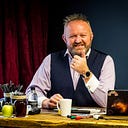#They
“They” is the word used to separate us.
People use the word ‘they’ to group others into some form of a collective that isn’t ‘you’ or ‘us’.
We have to be careful of the word ‘they’ because of its scapegoating, blaming and ostracising qualities.
I’ve found myself using ‘they’ in trying to comprehend this breakaway faction of contra-views to my own and those of the liberated world I thought I was a part of.
I’m over ‘they’ and it has to be about us, you and me. We.
I’ve been happy to be considered ‘alternative’ in my professional field because being one of who ‘they’ are, wasn’t what I wanted. Except there was no desire to just differentiate myself, I believed in a better way to do things like work, lead, learn, decide, include, design, do and that eventually, there would be no ‘they’ because it would all be ‘us’.
I accepted I might not be right — I expected not to be right. I expected to spark thoughts and deeds of better, nicer, calmer, leaner, clearer, smarter.
We is the language of interconnected, self-organised teams doing good for others. ‘They’ is the language of those who blame others, who resist the call to act, instead looking for ‘them’ to solve their problems. We is the language of those who step in and take responsibility.
I expected to see better results that were a move towards more sustainable lives. A repaired planet. A socially conscious and inclusive society. A more caring, kind and still efficient business world. They haven’t delivered it. Or rather, we haven’t.
‘They’ implies distance, detachment and a distinction when in reality, we’re all part of a series of intersections and what we do, affects others whether we like it or not.
Of course, I don’t agree with some of the current mindsets on isolationism, nationalism and demonisation of others. But such people are ‘us’ just in different guises. Our tolerance won’t run out of energy because of other’s views. Our tolerance will be charged by remembering that we’re all connected in some shape and whilst views may be abhorrent to you, understanding, dialogue and connection will overcome.
Having studied the landmark speeches of Dr Martin Luther King Jnr, I found barely a mention of ‘they’. And most definitely not in a divisive sense. Dr King’s address after the Selma to Montgomery march he used the word but in this sense:
“And in a real sense this afternoon, we can say that our feet are tired but our souls are rested. They told us we wouldn’t get here. There were those who said that we wouldn’t get here only over their dead bodies but all the world today knows that we are here and we are standing before the forces of power in the state of Alabama saying ‘We ain’t goin’ to let nobody turn us around’.”
He went on to mention the southern aristocracy who owned the Bourbon industry in the south and used ‘they’ in sentences that followed, to point to the manipulation of the media and public sentiment towards a segregated society. He made a distinguished attempt to not overuse ‘they’ and characterised those who were also poor but happened to be white, and who rallied to the segregated cause despite sharing the same social conditions as their fellow neighbours of colour.
‘They’ was not used by Dr King instead ‘we’ and ‘us’ appeared alongside specific names and traits of those who were arguably the oppressors.
Most of the ‘they’ approaches we readily use are about learned behaviours. To be racist, misogynistic, fascist — all learned behaviours. Mental models and societal constructs that talk to fear, anger, hate and the distances I referred to earlier.
A progressive society, a learned community, a compassionate world is above ‘they’ thinking, talking and doing.
We have to be more united than ever.
- A planet we have failed and plundered and an eco-system in need of repair and regeneration.
- People living lives of despair and poverty despite a welfare system created years ago to help those most in need. Societies cracking under the strain of socio-economic struggles and governments struggling to resolve complex issues and even redirecting financial support away from people valiantly working to help their fellow humans
- Wildlife and animals destroyed and living lives of misery to serve our needs when we can be conservationist and kind in the conditions we create for them to live and experience life as nature intended. Whilst we can still feed ourselves and not put these sentient beings through mechanised, agonising suffering.
It’s we, not they, that will make the difference. We have perhaps thought for too long that ‘they’ will solve it for us. Or blamed ‘them’ for the current plight.
It’s only we.
You are not stuck in traffic, you ARE the traffic.
They’re not taking us out of the European Union, we are facing life outside of the EU.
They’re not taxing fairly is we are all subject to unfair taxation.
Don’t entrench ‘them’. When we do, we help the cause they believe in, become a non-compromise because we’ve made ourselves the other ‘they’.
Lift everything above ‘they’ language and we’re onto something better.
I’ll close with more from Dr King’s Selma to Montgomery march concluding speech.
“We are on the move. Like an idea whose time has come, not even the marching of mighty armies can halt us. We are moving to the land of freedom.”
We, not they, will march on the problems of the world. Who made them is not important. That we fix them is.
Who denies them is not important. That we march on is.
Who gets in the way is not important. That we continue to march is.
We, not they, is what matters.
